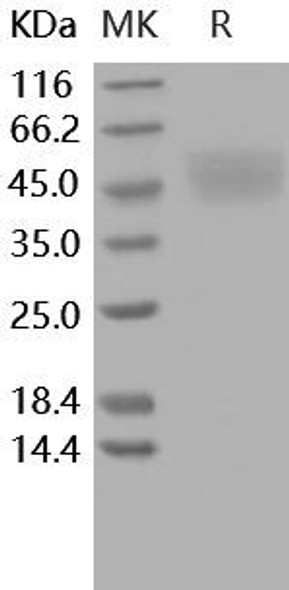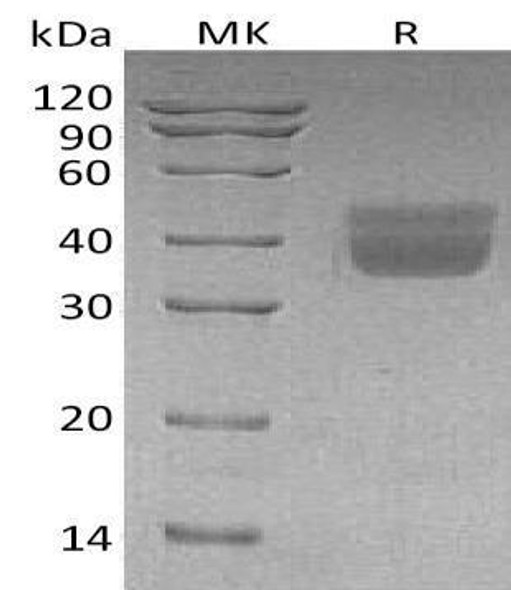Enzymes Recombinant Proteins
Human KLK1 Recombinant Protein (RPPB1858)
- SKU:
- RPPB1858
- Product Type:
- Recombinant Protein
- Species:
- Human
- Uniprot:
- P06870
- Research Area:
- Enzymes
Description
| Product Name: | Human KLK1 Recombinant Protein |
| Product Code: | RPPB1858 |
| Size: | 10µg |
| Species: | Human |
| Target: | KLK1 |
| Synonyms: | KLK1, KLK-1, HK1, HK-1, KLKR, KLK6, Tissue Kallikrein, hKLK1, EC 3.4.21.35, Kidney/pancreas/salivary gland kallikrein, Kallikrein-1. |
| Source: | Pichia Pastoris |
| Physical Appearance: | Sterile Filtered white lyophilized powder. |
| Formulation: | Lyophilized from a solution containing 1xPBS. |
| Solubility: | It is recommended to reconstitute the lyophilized KLK1 in sterile 18M-cm H2O not less than 100 �g/ml or more than 10 mg/ml solutions. |
| Stability: | Lyophilized KLK1 although stable at room temperature for 3 weeks, should be stored desiccated below -18°C. Upon reconstitution KLK1 should be stored at 4°C between 2-7 days and for future use below -18°C.For long term storage it is recommended to add a carrier protein (0.1% HSA or BSA).Please prevent freeze-thaw cycles. |
| Purity: | Greater than 98.0% as determined by both:(a) Analysis by RP-HPLC.(b) Analysis by SDS-PAGE. |
| Amino Acid Sequence: | The sequence of the first five N-terminal amino acids was determined and was found to be Ile-Val-Gly-Gly-Trp-Glu |
| Biological Activity: | Human Kallikrein-1 active Unit Definitin: 1 unit will hydrolyze 1 �mole of H-D-Val-Leu-Arg-pNA(S-2266) per minute at pH 8.0 at 37�C Human Kallikrein-1 measured biological activity of no less than 5 Units/mg (S2266 method). |
Kallikreins are serine protease enzymes having various physiological functions. Kallikreins are implicated in carcinogenesis and have potenital as novel cancer disease biomarkers. KLK1 is one of the fifteen kallikrein subfamily members located in a cluster on chromosome 19. KLK1 is functionally conserved in its ability to release the vasoactive peptide, Lys-bradykinin, from low molecular weight kininogen.Human Kallikrein-1, also called as Kallidinogenase, Kininogenase or Kininogenin, is an active protein enzyme present in saliva, pancreatic juices, and urine that catalyzes the proteolysis of bradykininogen to bradykinin. Kallikrein-1, which derived from human or porcine, have been used as drugs for a long time, they are mainly used in the treatment f light to medium hypertension and occlusion of cerebral and surrounding blood vessels. KLK1 demonstrates both trypsin- and chymotrypsin-like selectivities with Tyr/Arg preferred at site P1, Ser/Arg strongly preferred at P1', and Phe/Leu at P2. rs5517 in the KLK1 gene is considerably connected with hypertension in a Chinese Han population. KLK1 is expressed de novo in endothelial cells and mediates relaxation of human umbilical veins. The K allele of KLK1 promoter and TT genotype of TGF-beta1 are a genetic KLK1 -130 GN and -128 G-C, and the defenselessness factor contributing to progressive renal descent in Taiwanese primary vesicoureteric reflux children. Induction of KLK1 in carotid arteriosclerosis doesn�t lead to kallikrein-kinins pathway activation. Transgenic rats expressing KLK1 have impaired renal response to acute volume expansion Endothelial cells synthesize and release active form of KLK1on the surface which is important function in maintenance of circulation homeostasis. KLK1 participates in epidermal desquamation through cleavage of desmoglein 1 and regulation by lympho-epithelial Kazal-type-related inhibitor (LEKTI).
KLK1 Human Recombinant produced in Yeast is a single, glycosylated, polypeptide chain containing 238 amino acids and having a molecular mass of 28-32 kDa.KLK1 Human Recombinant is purified by proprietary chromatographic techniques.
| UniProt Protein Function: | KLK1: Glandular kallikreins cleave Met-Lys and Arg-Ser bonds in kininogen to release Lys-bradykinin. Belongs to the peptidase S1 family. Kallikrein subfamily. 2 isoforms of the human protein are produced by alternative splicing. |
| UniProt Protein Details: | Protein type:Protease; EC 3.4.21.35 Chromosomal Location of Human Ortholog: 19q13.3 Cellular Component: nucleus Molecular Function:serine-type endopeptidase activity Biological Process: proteolysis Disease: Kallikrein, Decreased Urinary Activity Of |
| NCBI Summary: | Kallikreins are a subgroup of serine proteases having diverse physiological functions. Growing evidence suggests that many kallikreins are implicated in carcinogenesis and some have potential as novel cancer and other disease biomarkers. This gene is one of the fifteen kallikrein subfamily members located in a cluster on chromosome 19. This protein is functionally conserved in its capacity to release the vasoactive peptide, Lys-bradykinin, from low molecular weight kininogen. [provided by RefSeq, Jul 2008] |
| UniProt Code: | P06870 |
| NCBI GenInfo Identifier: | 269849612 |
| NCBI Gene ID: | 3816 |
| NCBI Accession: | P06870.2 |
| UniProt Secondary Accession: | P06870,Q66US9, Q86U61, Q8TCV8, Q9BS53, Q9NQU4, Q9UD19 Q9UMJ1, |
| UniProt Related Accession: | P06870 |
| Molecular Weight: | 23,835 Da |
| NCBI Full Name: | Kallikrein-1 |
| NCBI Synonym Full Names: | kallikrein 1 |
| NCBI Official Symbol: | KLK1�� |
| NCBI Official Synonym Symbols: | hK1; KLKR; Klk6�� |
| NCBI Protein Information: | kallikrein-1; tissue kallikrein; glandular kallikrein 1; kallikrein serine protease 1; kallikrein 1, renal/pancreas/salivary; kidney/pancreas/salivary gland kallikrein |
| UniProt Protein Name: | Kallikrein-1 |
| UniProt Synonym Protein Names: | Kidney/pancreas/salivary gland kallikrein; Tissue kallikrein |
| Protein Family: | Kallikrein 1-related peptidase |
| UniProt Gene Name: | KLK1�� |
| UniProt Entry Name: | KLK1_HUMAN |






